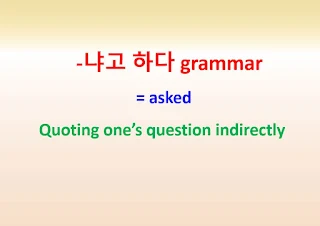Indirect quotations in Korean 다고/라고/자도/냐고 하다 = said, asked, told ~ citing of what some said, asked, requested, or commanded.
*A + -(으)냐고 하다
1. 의사님이 어디가 아프냐고 물어봤어요. (의사님: 어디가 아파요?)
The doctor asked where you are not comfortable.
2. 영화가 재미있으냐고 했어요. (나: 영화가 재미있어요?)
I asked if the movie is interesting.
2. Interrogative sentence: 냐고 하다 = asked ~quoting one's question indirectly
Usage:
- 냐고 하다 is used to quote one's question indirectly = (I/he/she) asked ...
Tense:
Vst + (느)냐고 하다 = asked ...
가다 --> 가냐고 하다
*놀다 --> 노냐고 하다
먹다 --> 먹냐고 하다 = 먹느냐고 하다
만나다 --> 만나냐고 하다
만나다 --> 만나냐고 하다
A + -(으)냐고 하다 = asked ...
춥다 --> 춥냐고 하다 = 추우냐고 하다
예쁘다 --> 예쁘냐고 하다
재미있다 --> 재미있으냐고 하다
예쁘다 --> 예쁘냐고 하다
재미있다 --> 재미있으냐고 하다
N +(이)냐고 하다 = asked ...
학생 --> 학생이냐고 하다
의사 --> 의사냐고 하다
의사 --> 의사냐고 하다
Examples:
*Vst + -(느)냐고 하다
1. 한국에 온 지 얼마나 됐냐고 했어요. (남자: 한국에 온지 얼마나 됐어요?)
He asked how long have you been in Korea.
2. 이번 한국어능력시험은 언제까지 접수하냐고 했어요. (남자: 이번 한국어능력시험은 언제까지 접수해요?)
He asked until when can he sign up for the TOPIK exam.
3. 수지 씨가 매운 음식을 안 먹냐고 물어봤어요. (수지: 매운 음식을 안 먹어요?)
Suzy asked me if I don't eat spicy food.
4. 엄마가 어디에 가냐고 했어요. (엄마: 어디에 가?)
Mom asked her child where does he go?
1. 한국에 온 지 얼마나 됐냐고 했어요. (남자: 한국에 온지 얼마나 됐어요?)
He asked how long have you been in Korea.
2. 이번 한국어능력시험은 언제까지 접수하냐고 했어요. (남자: 이번 한국어능력시험은 언제까지 접수해요?)
He asked until when can he sign up for the TOPIK exam.
3. 수지 씨가 매운 음식을 안 먹냐고 물어봤어요. (수지: 매운 음식을 안 먹어요?)
Suzy asked me if I don't eat spicy food.
4. 엄마가 어디에 가냐고 했어요. (엄마: 어디에 가?)
Mom asked her child where does he go?
5. 가영 씨가 뭐라고 했어요?
- 제주도에서 어떤 숙소에 묵느냐고 물었어요. (묵다 = stay)
What did Gayoung say?
- She asked what kind of accommodation we were staying at in Jeju Island.
*A + -(으)냐고 하다
1. 의사님이 어디가 아프냐고 물어봤어요. (의사님: 어디가 아파요?)
The doctor asked where you are not comfortable.
2. 영화가 재미있으냐고 했어요. (나: 영화가 재미있어요?)
I asked if the movie is interesting.
3. 민우 씨가 오늘 많이 바쁘냐고 물었어요. (민우: 오늘 많이 바빠요?)
Minwoo asked if I was very busy today.
4. 지훈 씨가 뭐라고 했어요?
- 오늘 날씨가 덥냐고 했어요. (지훈: 오늘 날씨가 더워요?)
What did Jihoon say?
- I asked if the weather is hot today.
5. 선생님께서 아까 뭐라고 하셨어요?
- 어디가 아프냐고 물어보셨어요. (선생님: 어디에 아파요?)
What did the doctor say earlier?
- She asked me where I hurts.
*N +(이)냐고 하다
1. 여기가 어디냐고 해요/했어요. (남자: 여기가 어디예요?)
He asked where is this place.
2. 남자 친구가 대학생이냐고 해요/했어요. (여자: 남자 친구가 대학생이에요?)
She asked me if my boyfriend is a college student.
Explore the related grammars:
1. Declarative sentence: 다고 하다 ~citing one's statement
2. Suggestive sentence: 자고 하다 ~citing one's suggestion
3. Imperative sentence: 라고 하다 ~citing one's request or command


The grammar is updated on 26 April 2023. Hope you enjoy studying at koreantopik.
ReplyDelete